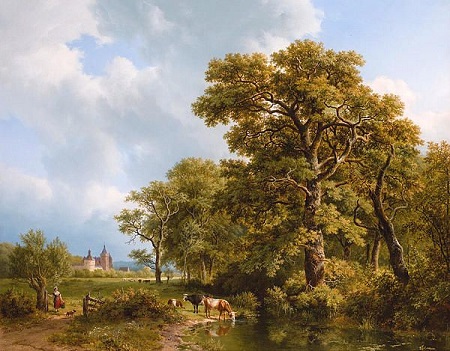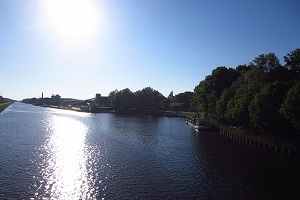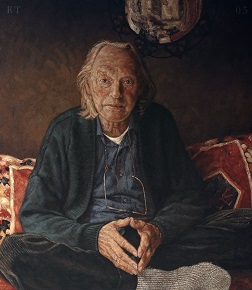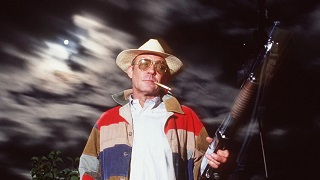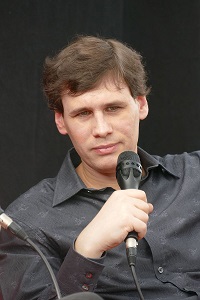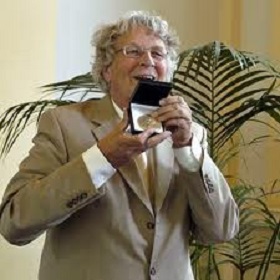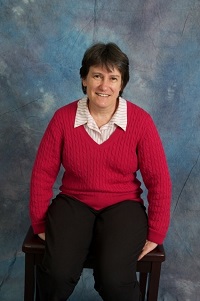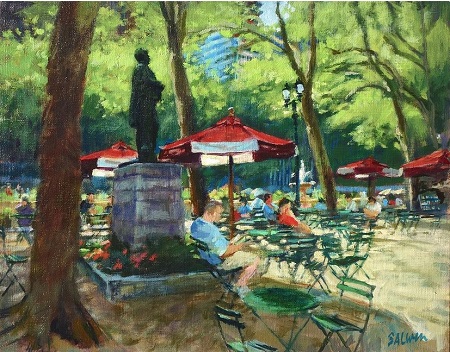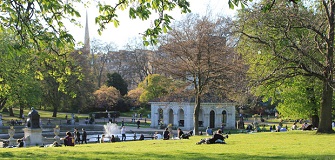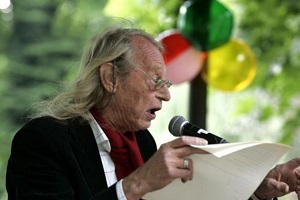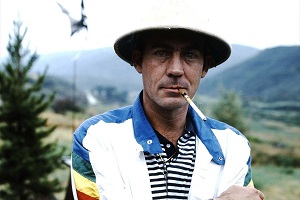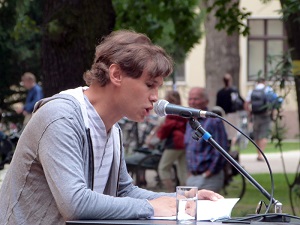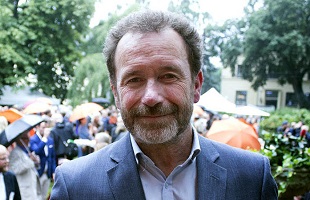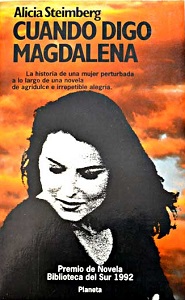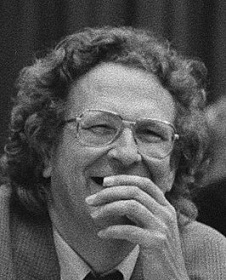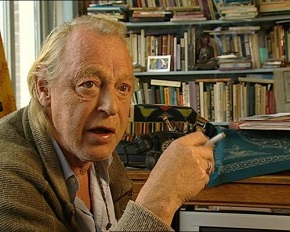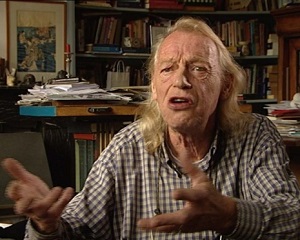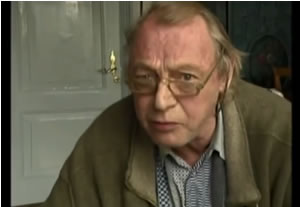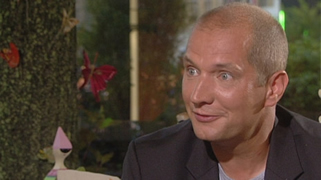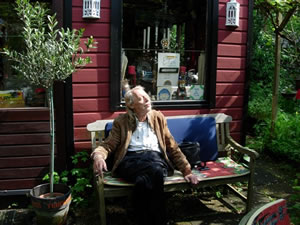De Nederlandse dichter en schrijver Simon Vinkenoog werd op 18 juli 1928 in Amsterdam geboren. Zie ook alle tags voor Simon Vinkenoog op dit blog.
Faits Divers
Je est un autre. Arthur Rimbaud
ik ben een vreemde in eigen bloed
mijn hartslag klopt aan andere deuren
van het schuim der goden herken ik de kleuren
maar het is ik die mij huiveren doe
het zijn de eigen ogen die mij breken
en de stenen
die als ontluikende bloemen
langzaam aan mijn ingewanden groeien
ik ben verdronken in dit drijfzandlied
van waaruit duizend doden smeken:
– in dit naaktlandschapp dat leven heet
drijft doodgezongen de tijd uiteen –
kringen verleden zonder heden
woorden klanken gestamel
Volluk
Ik groeide op in volksbuurten
als volksjongen
ik bezocht wekelijks het volksbadhuis
ooit at ik wel eens in een volksgaarkeuken
en af en toe in de Volkenbond bij het Entrepôtdok.
Op de Albert Cuypmarkt bezoek ik graag een volkskoffiehuis
waar ik luister naar volkswijsheid uit de volksmond;
mijn moeder was volksvrouw
en leed aan volksziekte of -woede:
Schoonhouden! Voeten vegen!
Wat moeten de buren wel denken!
Ik wierp wel eens een blik in een krant
die zich het Volksdagblad noemde
en een van de kranten die ik lees
heet de Volkskrant
Ik weet niets van volksaard of volkseigen
ik ben geen volksmenner of volksschrijver
en speel in geen enkel volkstheater
Ik ben niemands volksvertegenwoordiger
spreek namens geen enkele bevolkingsgroep
en schrijf dit in mijn volkstuin
in het Nederlands, de taal van het volk
waartoe ik behoor.
Volluk! Is daar iemand?

Simon Vinkenoog (18 juli 1928 – 12 juli 2009)
De Duitse dichter en schrijver Steffen Popp werd geboren op 18 juli 1978 in Greifswald, Hij groeide op in Dresden en bezocht daar een natuurwetenschappelijke bijzondere school. Popp studeerde aan het Deutsche Literaturinstitut Leipzig en daarna literatuurwetenschap en filosofie in Berlijn. In 2004 verscheen zijn dichtbundel Wie Alpen, in 2008 gevolgd door Kolonie Zur Sonne. Zijn roman Ohrenberg oder der Weg dorthin werd diverse keren bekroond. Samen met Uljana Wolf vertaalde hij werk van de Amerikaanse dichter Christian Hawkey. De bundel verscheen in 2008 onder de titel “Reisen in Ziegengeschwindigkeit`. Zie ook mijn blog van 14 juli 2009
Gibraltar
dahin (Goethe)
Kennst du, Geliebter, den Hass
Bäume, die spanische Wand
kennst du die Inseln, Kreuzfahrer
in ihren Ein-Mann-Torpedos –
Geliebter, verzeih, ich wollte nach Golgatha
aber im Wäscheschrank
lag nur ein gelber Revolver (so blieb ich).
Kennst du die See, Spuren von Kühnheit
im Schaum, Geliebter, im Schaum
kennst du das Land, seinen verrenkten Tragarm
schwer liegt es herum, unter der hungrigen Luft
planloser Wind
Wollspuren, Wärme und Staub darin.
Wie gern zög’ ich hinaus
wohnte, Geliebter, mit dir, unter Zitronen:
gingen nicht, in meinen tragischen Venen
die Elemente Gibraltars
schwer um und aller verschollenen Kaps
manische Augen, lidlos –
mein Herz ist eine Gräfin, umstellt von Pflegern am Rand der City, Geliebter
blöken die Mietklaviere!

Steffen Popp (Greifswald, 18 juli 1978)
De Argentijnse schrijfster en vertaalster Alicia Steimberg werd geboren op 18 juli 1933 in Buenos Aires. Zie ook alle tags voor Alicia Steinberg op dit blog.
Uit: The Rainforest
„I’m in the rainforest, and it’s very hot and humid; at times a warm drizzle falls. Eyes closed, I lift my face to catch the water and drink a little, while a steel-blue and cadmium-yellow macaw watches
me without turning its head. This is how I spend my days, among charming monkeys, benevolent serpents, motionless parrots, and foliage that enfolds me. With each step I take, flower-laden branches envelop me. I’d gladly remain here, tasting raindrops and picking the occasional fruit from the lowest branches. The fruit resembles chirimoyas, mangos, bananas.
There’s no danger of getting lost in the rainforest. My compass guides me whenever it’s time to return. I know I have to head east, and in fifteen minutes I’m in the clearing where the hotel is located.
As you approach the hotel in the afternoon, you can smell dinner: there’s always rice with vegetables and meat, poultry, or seafood, everything seasoned with fragrant herbs. They raise the fowl in a chicken coop out back. I love to go in there and steal a freshly laid egg for the next morning’s breakfast. The chickens here don’t get a balanced diet, just natural food, so they have that marvelous, oldfashioned flavor and aroma. It reminds me of an educational poster I always used to look for in the library of the teacher’s college when I was studying for my degree. The poster was old and worn: it
almost certainly dated back to the nineteenth century when the school was founded, and I used it for a demonstration lesson for an elementary school class. It showed some multicolored chickens and a magnificent rooster, illuminated by a sunbeam streaming across a wire fence. In those hectic, tense years of my youth, when it frightened me to realize that I didn’t know what I wanted (I’m practically
an old woman now, and I’m still not sure), that chicken coop picture was like a refuge. As a girl, I used to get sick quite often, and Mama was convinced that the country, with its fresh air, was the key to good health.“

Alicia Steimberg (Buenos Aires, 18 juli 1933)
De Russische dichter Jevgeny Jevtoesjenko werd geboren in Zima in Irkutsk op 18 juli 1933. Zie ook alle tags voor Jevgeni Jevtoesjenko op dit blog en ook mijn blog van 18 juli 2010.
Disbelief In Yourself is Indispensable
While you’re alive it’s shameful to worm your way into
the Calendar of Saints.
Disbelief in yourself is more saintly.
It takes real talent not to dread being terrified
by your own agonizing lack of talent.
Disbelief in yourself is indispensable.
Indispensable to us is the loneliness
of being gripped in the vise,
so that in the darkest night the sky will enter you
and skin your temples with the stars,
so that streetcars will crash into the room,
wheels cutting across your face,
so the dangling rope, terrible and alive,
will float into the room and dance invitingly in the air.
Indispensable is any mangy ghost
in tattered, overplayed stage rags,
and if even the ghosts are capricious,
I swear, they are no more capricious than those who are alive.
Indispensable amidst babbling boredom
are the deadly fear of uttering the right words
and the fear of shaving, because across your cheekbone
graveyard grass already grows.
It is indispensable to be sleeplessly delirious,
to fail, to leap into emptiness.
Probably, only in despair is it possible
to speak all the truth to this age.
It is indispensable, after throwing out dirty drafts,
to explode yourself and crawl before ridicule,
to reassemble your shattered hands
from fingers that rolled under the dresser.
Indispensable is the cowardice to be cruel
and the observation of the small mercies,
when a step toward falsely high goals
makes the trampled stars squeal out.
It’s indispensable, with a misfit’s hunger,
to gnaw a verb right down to the bone.
Only one who is by nature from the naked poor
is neither naked nor poor before fastidious eternity.
And if from out of the dirt,
you have become a prince,
but without principles,
unprince yourself and consider
how much less dirt there was before,
when you were in the real, pure dirt.
Our self-esteem is such baseness….
The Creator raises to the heights
only those who, even with tiny movements,
tremble with the fear of uncertainty.
Better to cut open your veins with a can opener,
to lie like a wino on a spit-spattered bench in the park,
than to come to that very comfortable belief
in your own special significance.
Blessed is the madcap artist,
who smashes his sculpture with relish-
hungry and cold-but free
from degrading belief in himself.
Vertaald door Antonina W. Bouis, Albert C. Todd en Jevgeni Jevtoesjenko

Jevgeni Jevtoesjenko (Zima, 18 juli 1933)
De Engelse schrijver William Makepeace Thackeray werd geboren in Calcutta op 18 juli 1811. Zie ook alle tags voor William Makepeace Thackeray op dit blog en mijn blog van 18 juli 2010.
Uit: Vanity Fair
„In Miss Jemima’s eyes an autograph letter of her sister, Miss Pinkerton, was an object of as deep veneration as would have been a letter from a sovereign. Only when her pupils quitted the establishment, or when they were about to be married, and once, when poor Miss Birch died of the scarlet fever, was Miss Pinkerton known to write personally to the parents of her pupils; and it was Jemima’s opinion that if anything could console Mrs. Birch for her daughter’s loss, it would be that pious and eloquent composition in which Miss Pinkerton announced the event.
In the present instance Miss Pinkerton’s “billet” was to the following effect:
-The Mall, Chiswick, June 15, 18-
Madam,
After her six years’ residence at the Mall, I have the honour and happiness of presenting Miss Amelia Sedley to her parents, as a young lady not unworthy to occupy a fitting position in their polished and refined circle. Those virtues which characterize the young English gentlewoman, those accomplishments which become her birth and station, will not be found wanting in the amiable Miss Sedley, whose industry and obedience have endeared her to her instructors, and whose delightful sweetness of temper has charmed her aged and her youthful companions.
In music, in dancing, in orthography, in every variety of embroidery and needlework, she will be found to have realized her friends’ fondest wishes. In geography there is still much to be desired; and a careful and undeviating use of the backboard, for four hours daily during the next three years, is recommended as necessary to the acquirement of that dignified deportment and carriage, so requisite for every young lady of fashion.
Your most obliged humble servant,
Barbara Pinkerton
P.S.–Miss Sharp accompanies Miss Sedley. It is particularly requested that Miss Sharp’s stay in Russell Square may not exceed ten days. The family of distinction with whom she is engaged, desire to avail themselves of her services as soon as possible.“

William Makepeace Thackeray (18 juli 1811 – 24 december 1863)
De Franse schrijfster Nathalie Sarraute werd geboren op 18 juli 1900 in Ivanova, Rusland. Zie ook alle tags voor Nathalie Sarraute op dit blog en mijn blog van 18 juli 2010.
Uit: Enfance
„Voici enfin le moment attendu où je peux étaler le volume sur mon lit, l’ouvrir à l’endroit où j’ai été forcée d’abandonner… je m’y jette, je tombe… impossible de me laisser arrêter, retenir par les mots, par leur ens, leur aspect, par le déroulement des phrases, un courant invisible m’entraîne avec ceux à qui de tout mon être imparfait mais avide de perfection je suis attachée, à eux qui sont la bonté, la beauté, la grâce, la noblesse, la pureté, le courage mêmes… je dois avec eux affronter des désastres, courir d’atroces dangers, lutter au bord de précipices, recevoir dans le dos des coups de poignard, être séquestrée, maltraitée par d’affreuses mégères, menacée d’être perdue à jamais… et chaque fois, quand nous sommes tout au bout de ce que je peux endurer, quand il n’y a plus le moindre espoir, plus la plus légère possibilité, la plus fragile vraisemblance… cela nous arrive… un courage insensé, la noblesse, l’intelligence parviennent juste à temps à nous sauver… .
C’est un moment de bonheur intense… toujours très bref… bientôt les transes, les affres me reprennent… évidemment les plus valeureux, les plus beaux, les plus purs ont jusqu’ici eu la vie sauve… jusqu’à présent… mais comment ne pas craindre que cette fois… il est arrivé à des êtres à peine moins parfaits… si, tout de même, ils l’étaient moins, et ils étaient moins séduisants, j’y étais moins attachée, mais j’espérais que pour eux aussi, ils le méritaient, se produirait au dernier moment… eh bien non, ils étaient, et avec eux une part arrachée à moi-même, précipités du haut des falaises, broyés, noyés, mortellement blessés… car le Mal est là, partout, toujours prêt à frapper…“

Nathalie Sarraute (18 juli 1900 – 19 oktober 1999)
De Nederlandse schrijver, criticus en politicus Aad Nuis werd geboren op 18 juli 1933 in Sliedrecht. Zie ook alle tags voor Aad Nuis op dit blog en ook mijn blog van 18 juli 2010.
Uit: Het huis van een zwerver (over Breyten Breytenbach)
„Een jonge schilder laat zijn academie in de steek en trekt de wereld in, komt na omzwervingen in Parijs terecht, maakt naam. Hij schrijft ook gedichten en poëtische prozastukken, die hem beroemd maken, zij het alleen in zijn vaderland, omdat ze in de taal daarvan geschreven zijn. Op zijn vijfentwintigste krijgt hij er een grote prijs voor. Een rimpelloos succesverhaal – ware het niet dat Breytenbach uit Zuid-Afrika kwam, dat hij inmiddels getrouwd was met zijn Zuid-Vietnamese geliefde, dat hij niet samen met haar zijn geboorteland binnen mocht om de prijs in ontvangst te nemen. Dat was in 1964. Vanaf die tijd, en zeker nadat hij in 1975 tijdens een clandestien bezoek aan Zuid-Afrika was gearresteerd en voor zeven jaar in de gevangenis verdween, kent de wereld hem als publiek personage.
Hij heeft die rol met verve gespeeld, eigenzinnig en met zoveel openhartige kritiek naar alle kanten dat geen enkele politieke stroming of partij hem ooit lang heeft kunnen gebruiken als mascotte van het eigen gelijk. Zijn werk als kunstenaar lijkt evenwel in de schaduw te zijn gebleven van zijn publieke faam. Ik zou geen andere, nog levende schrijver weten die zo bekend is en toch door zo weinigen wordt gelezen.
Naar de reden daarvan hoeft niet ver te worden gezocht. De kern van zijn werk is poëzie en met die poëzie nauw verwant proza, niet makkelijker te lezen dan bijvoorbeeld Lucebert of Claus, en geschreven in het Afrikaans. Om het uit de eerste hand te kunnen ondergaan moet je dus niet alleen die taal goed kennen, maar ook enige kijk hebben op moderne poëzie.“

Aad Nuis (18 juli 1933 – 8 november 2007)
De Duitse schrijver Ludwig Harig werd geboren op 18 juli 1927 in Sulzbach. Zie ook alle tags voor Ludwig Harig op dit blog.
Im Flirt mit Dame Gott
Für Paul Wühr
Ach Paul, mein lieber Paul, du dichtest mit Gespür
dich außerhalb der Zeit in eine helle Ferne,
die uns illuminiert wie Aladins Laterne:
Du reibst, und es erscheint dein Vers en miniature.
Es schwingt dein Silbenfuß im Takt und tanzt die Kür
im Flirt mit Dame Gott bis an den Rand der Sterne.
Der eine sucht den Sinn, der andre das Moderne.
So ist nun mal die Welt, was kann Paul Wühr dafür?
Der schmale Trampelpfad erweitert sich zur Pforte.
Was gibt es rundumher, was außerhalb der Worte,
die für uns Wörter sind und kein Begriff darüber?
Was bleibt, ist kurz gesagt des Lebens Paraphrase,
das Übel mit dem Kreuz, das Elend mit der Blase.
So stehen wir perplex dem Wortschrott gegenüber.
Das schreibende Subjekt
Ergreift der Mensch den Stift, schon wird er kategorisch.
Das schreibende Subjekt bedient sich der Poetik,
schmäht nicht das Regelwerk berechneter Ästhetik:
das Werk aus hohlem Bauch bleibt meistens illusorisch.
Gelehrtenverse sind gebildet und rhetorisch,
die auditive Kunst berauscht sich in Phonetik,
konkrete Poesie gefriert in Arithmetik,
das lyrische Gedicht ist meistens metaphorisch.
Ein ganzer Kanon steht dem Schreiber zur Verfügung,
dem schieren Leidendruck, der köstlichen Vergnügung:
es ist die ganze Welt auf einmal kreativ.
Den einen quält das All, den andern plagt die Enge,
es wechselt freies Spiel in arge Ausdruckszwänge:
der eine ist erwacht, dieweil der andre schlief.

Ludwig Harig (Sulzbach 18 juli 1927)
De Poolse dichter, schrijver en essayist Jan Stanisław Skorupski werd geboren op 18 juli 1938 in Łosznióv in Podolië. Zie ook alle tags voor Jan Stanisław Skorupski op dit blog.
Das Sonett über den Galgen-Kran
ich lache weil der Hausbesitzer
zeigt seine Maske – ein rarer Fall
die Skulptur dekoriert das Portal
er wird für uns wie ein Beschützer
in dem Literaturhaus – Tango
ich will nicht auf dem Boden sitzen
im DADA-Haus muss ich nicht schwitzen
Gala-Konzert-Probe mit Mango
vom Gran Café auf den Lindenhof
ist die schönste Aussicht in der Stadt
einen Kran dort bauen? – dumm und doof
ich erhänge mich auf dem Galgen
vorher gebe ich den guten Rat
macht doch nicht mehr solchen Dummheiten

Jan Stanisław Skorupski (Łosznióv, 18 juli 1938)
De Duitse dichteres en schrijfster Ricarda Huch werd op 18 juli 1864 in Braunschweig geboren. Zie ook mijn blog van 18 juli 2009.
Uralt Gebirge , wie vor Jahren
Uralt Gebirge , wie vor Jahren
Silbern gegossen in vollkommener Pracht
Ruhst du; weit bin ich umgefahren,
Wund komm ich aus verlorner Schlacht,
In deinem Schoß bald Staub mit meiner Habe,
Ein Traum, ein Nichts, und doch voll Ewigkeiten!
Dereinst zerbrech ich deine Felsenseiten
Und lodre glorreich aus geborstnem Grabe.
Ein Todesengel, göttlich sanft und schön
Ein Todesengel, göttlich sanft und schön,
Trägst du gen Himmel mächtig meine Seele.
Durch alle Nacht hindurch, wie Stürme wehn,
Fühlst du den Weg, den ich allein verfehle.
Wie rücken die Gestirne weit, so weit!
Der Erde fern und fern der Ewigkeit
Nichts faß ich mehr als deines Herzens Schlagen.
Ein Adler ist´s, der steigt: einst wird es tagen.

Ricarda Huch (18 juli 1864 – 17 november 1947)
De Franse dichter Tristan Corbière werd geboren op 18 juli 1845 in Morlaix in de Bretagne. Zie ook mijn blog van 18 juli 2009.
Sonnet de nuit
O croisée ensommeillée,
Dure à mes trente-six morts !
Vitre en diamant, éraillée
Par mes atroces accords !
Herse hérissant rouillée
Tes crocs où je pends et mords !
Oubliette verrouillée
Qui me renferme… dehors !
Pour Toi, Bourreau que j’encense,
L’amour n’est donc que vengeance ?..
Ton balcon : gril à braiser ?…
Ton col : collier de garotte ?…
Eh bien ! ouvre, Iscariote,
Ton judas pour un baiser !
Pauvre garçon
Lui qui sifflait si haut, son petit air de tête,
Etait plat près de moi ; je voyais qu’il cherchait…
Et ne trouvait pas, et… j’aimais le sentir bête,
Ce héros qui n’a pas su trouver qu’il m’aimait.
J’ai fait des ricochets sur son coeur en tempête.
Il regardait cela… Vraiment, cela l’usait ?…
Quel instrument rétif à jouer, qu’un poète ! …
J’en ai joué. Vraiment – moi – cela m’amusait.
Est-il mort ?… Ah – c’était, du reste, un garçon drôle.
Aurait-il donc trop pris au sérieux son rôle,
Sans me le dire… au moins, – Car il est mort, de quoi ?…
Se serait-il laissé fluer de poésie…
Serait-il mort de chic, de boire, ou de phtisie,
Ou, peut-être, après tout : de rien… ou bien de Moi.

Tristan Corbière (18 juli 1845 – 1 maart 1875)
Sculptuur van Edouard Corbière en Tristan Corbière in Morlaix
De Nederlandse romanschrijver en journalist Jan Gerhard Toonder werd geboren in Rotterdam op 18 juli 1914. Zie ook mijn blog van 18 juli 2007.
Uit: Adriaan Venema: De zuivering (Schrijvers, uitgevers en hun collaboratie)
“‘Voor het voetlicht, een verdediging’ was de titel van het artikel van Jan Gerhard Toonder. Allereerst kwam hij voor het imago van de kunstenaar zelf op514: ‘Wij wenschen vast te stellen, dat op 14 Mei 1940, toen het gordijn opging voor de grootste tragedie die zich ooit in Nederland afspeelde, de kunstenaars in groote meerderheid hun positie al bepaald hadden als verbeten vijanden van het nationaal-socialisme. Hiertoe behoorden ook verreweg de meesten van hen, die twee jaar later ingeschreven zouden worden in de Kultuurkamer.’
Toonder geeft daarvoor geen enkel bewijs; in ieder geval ben ik zijn naam in welke vooroorlogse protestactie van kunstenaars tegen nationaal-socialisme of fascisme dan ook niet tegengekomen. En op die ‘verbeten’ vijandschap van verreweg de meeste Kultuurkamer-aanmelders kom ik later nog terug.
De oorlog brak uit en met veel pathos gaf Toonder weer wat in zijn visie de kunstenaar toen bezielde: ‘Vele kunstenaars voelden toen de noodzaak, zelfs de plicht, om de teneergeslagenen en stuurloozen een hart onder de riem te steken. Zij vatten den strijd op, zoowel tegen de zwakte, die op dat moment ons volk besloop, als tegen het regime dat met een geraffineerde geleidelijkheid aan ons werd opgedrongen. Ook nu streden zij met hun natuurlijk wapen-de kunst. En die groote, hernieuwde belangstelling voor de goede en gezonde Nederlandsche kunst, die sinds het najaar 1940 bij het Nederlandsche volk viel te constateeren, bewijst dat de kunstenaars de juiste snaar bespeelden. Zij brachten iets, dat fierdere sentimenten in het volk losmaakte. En het volk vroeg naar kunst, meer dan ooit, krachtiger dan ooit, omdat het er juist nu, in de steeds toenemende verdrukking, behoefte aan gevoelde, omdat het er kracht uit kon putten.
Wie dit ontkent, loochent de feiten.
Wie dit ontkent, beleedigt ons volk in zijn kunst-gevoeligheid.
Wie dit ontkent, ontkent de kunst als bron van geestkracht en leven.’

Jan Gerhard Toonder (18 juli 1914 – 25 augustus 1992)
De Nederlandse schrijfster Josepha Judica Mendels werd geboren op 18 juli 1902 te Groningen. Zie ook alle tags voor Josepha Mendels op dit blog.
Uit: Je wist het toch…
“‘Henriëtje had ook een zuster: Mirjam.
In het witte huis aan het water had Mirjam haar geluk gevonden. Het leven had haar tot haar huwelijk toe niet verwend. Ze was de middelste thuis en kreeg bijvoorbeeld nooit een nieuwe jurk, omdat ze juist in de maat van de oudste viel. Wanneer de jongste hiervoor op haar beurt in aanmerking kwam, was het kledingstuk versleten. Ze mocht bijvoorbeeld nooit mee uit naar een bijzondere gelegenheid. Of ze was er te klein voor, of te groot. Dit maakte dat ze uiterst gauw beledigd was, zoals de ouders dat noemden. Ze werd dan eerst rood, dan lelijk en tenslotte allerverschrikkelijkst brutaal.
Op de h.b.s. was ze een minder dan middelmatige leerling. Ze kreeg alras vrijstelling van wiskunde en kon zich dus met zo’n ijver op de andere vakken toeleggen, dat ze haar talen heel goed leerde.
Wat moest ze toen na haar eindexamen beginnen? Ik wil trouwen dacht ze, en kinderen hebben, maar dit kon ze tegen haar ouders niet zeggen. Liefde en alles wat daar zo bij kwam was iets waarover je niet sprak, het gebeurde in je leven of het gebeurde niet[.] Daarbij wist ze zelf ook niet wat het eigenlijk betekende. Ze had zin van huis weg te gaan, en dat was alles.’

Josepha Mendels (18 juli 1902 – 10 september 1995)
De natuurkundige en schrijver Bobby Henderson werd geboren op 18 juli 1979 in Roseburg, Oregon. Zie ook mijn blog van 18 juli 2007.
Uit: Open Letter To Kansas School Board
„I am writing you with much concern after having read of your hearing to decide whether the alternative theory of Intelligent Design should be taught along with the theory of Evolution. I think we can all agree that it is important for students to hear multiple viewpoints so they can choose for themselves the theory that makes the most sense to them. I am concerned, however, that students will only hear one theory of Intelligent Design.
Let us remember that there are multiple theories of Intelligent Design. I and many others around the world are of the strong belief that the universe was created by a Flying Spaghetti Monster. It was He who created all that we see and all that we feel. We feel strongly that the overwhelming scientific evidence pointing towards evolutionary processes is nothing but a coincidence, put in place by Him.
It is for this reason that I’m writing you today, to formally request that this alternative theory be taught in your schools, along with the other two theories. In fact, I will go so far as to say, if you do not agree to do this, we will be forced to proceed with legal action. I’m sure you see where we are coming from. If the Intelligent Design theory is not based on faith, but instead another scientific theory, as is claimed, then you must also allow our theory to be taught, as it is also based on science, not on faith.“

Bobby Henderson (Roseburg, 18 juli 1979)
The Flying Spaghetti Monste Doodle Google



